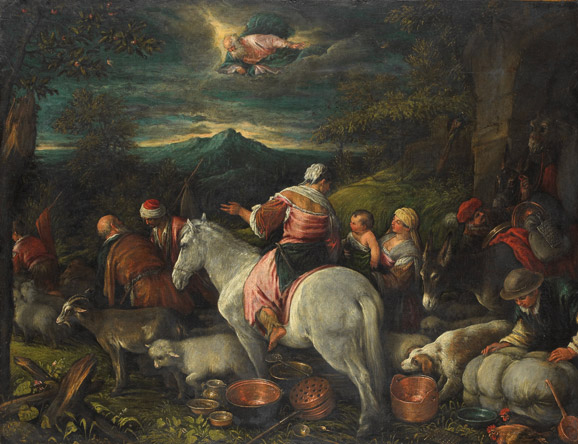Abraham’s exile to Harran, often characterized in various religious traditions as a pivotal moment in his spiritual journey, presents a profound exploration of faith, obedience, and the complexities of human morality. Harran, described in historical texts as a town notorious for its sinfulness, serves as a backdrop for understanding the weight of Abraham’s decisions and their broader implications within the Bahá’í worldview.
The story of Abraham’s exile begins with his call to leave Ur of the Chaldeans, a society steeped in idolatry and moral decay. This initial departure signifies more than a mere geographic transition; it embodies a profound spiritual awakening. Abraham, as a revered figure in the Bahá’í Faith, symbolizes the quest for divine truth amidst societal moral failings. The narrative initiates a significant theme within the Bahá’í teachings: the notion of detachment from worldly attachments to embody a pure and devoted relationship with God.
As Abraham journeys toward Harran, he finds himself in a locale that starkly contrasts his ideals. Harran is frequently depicted as a city engrossed in depravity and the worship of false gods. This juxtaposition highlights the challenges that individuals face when navigating environments rife with moral ambiguity. In the Bahá’í framework, this notion resonates deeply; adherents are encouraged to rise above the spiritual distractions that characterize contemporary society. Abraham’s sojourn in Harran thus serves as a metaphor for the spiritual trials that individuals may encounter in their pursuit of truth.
The concept of exile, particularly in a Bahá’í context, can be understood on multiple levels. On one hand, it is a literal displacement; on the other, it represents an internal struggle and separation from erroneous beliefs. Abraham spends a considerable time in Harran, engaging with its inhabitants, albeit reluctantly. His experience illustrates the essential Bahá’í principle of engagement with society, even when its values may not align with one’s own. Rather than isolating himself, Abraham’s presence in Harran signifies an active participation in promoting spiritual awakening, illustrating the importance of dialogue in religious development.
Moreover, the dynamics of Abraham’s interactions within Harran reveal insights into human nature and the moral dilemmas that accompany community life. The town’s ethos challenges his beliefs and tests his fortitude. In Bahá’í teachings, the concept of testing is vital. Adherents believe that trials serve as catalysts for spiritual growth and understanding. Abraham’s experiences can thus be perceived as formative experiences that ultimately deepen his resolve and connection to the Divine.
The narrative also engages with the idea of prophetic leadership. Abraham’s role as a prophet is crucial in understanding how Bahá’ís view the evolution of religious thought. Prophets are seen as figures who constantly challenge human existence, urging followers to transcend their limitations and societal norms. In the face of Harran’s sinful nature, Abraham’s unwavering commitment to monotheism and righteousness serves as a clarion call for ethical living, encapsulating the foundational belief in the oneness of God and humanity that underpins Bahá’í teachings.
This scenario raises essential questions regarding the nature of sin and redemption. In Bahá’í thought, sin is not solely a transgression but also encompasses the failure to recognize one’s potential for goodness and truth. Harran embodies an environment conducive to sin, yet it offers opportunities for redemption through conscious choice and moral rectitude. Abraham’s exile becomes a powerful narrative for Bahá’ís, illustrating how individuals can navigate challenging circumstances while retaining fidelity to their spiritual convictions. This intertwining of morality with social existence underscores the Bahá’í objective of fostering a just and harmonious global community.
Abraham’s eventual departure from Harran accentuates the importance of spiritual liberation and progression. The Bahá’í teachings advocate for the continual pursuit of truth and adherence to divine guidance, irrespective of the prevailing societal norms. The finality of Abraham’s escape from Harran is emblematic of the overarching theme of divine assistance for those who strive sincerely. His story culminates in a call to action for Bahá’ís to engage in their own transformative journeys, advocating for social change while embracing spiritual convictions.
Throughout this examination, the account of Abraham’s exile to Harran transcends mere historical narrative. It offers a potent allegory for the interplay between spirituality and societal morality. The experiences of Abraham resonate profoundly within the framework of Bahá’í teachings, emphasizing the necessity of perseverance in the face of adversity. The encouragement to remain engaged with the world, to challenge unworthy practices, and to seek a higher truth forms the crux of Bahá’í spirituality, urging followers to emulate the qualities of prophetic figures like Abraham.
In conclusion, the narrative of Abraham’s exile to Harran serves as a multifaceted exploration of faith, morality, and the perseverance required in the journey toward divine truth. Through this lens, Bahá’í teachings invite individuals to reflect on their roles within society and their responsibilities toward spiritual and communal well-being. The legacy of Abraham encourages adherents to confront the moral complexities of their environment while striving unceasingly to foster a spiritually uplifted global community, resolving to act in accordance with the principles of justice, unity, and compassion that define this contemporary faith.
